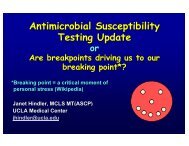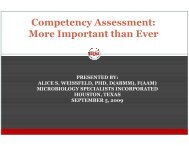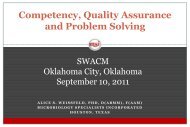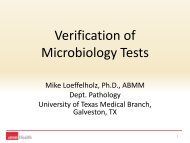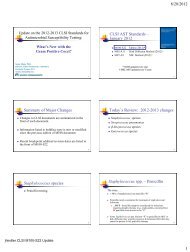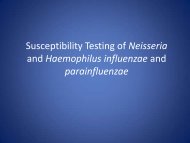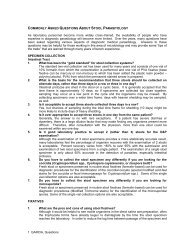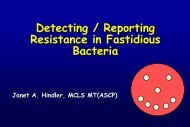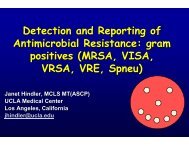Community-Associated Staphylococcus aureus ... - SWACM
Community-Associated Staphylococcus aureus ... - SWACM
Community-Associated Staphylococcus aureus ... - SWACM
Create successful ePaper yourself
Turn your PDF publications into a flip-book with our unique Google optimized e-Paper software.
Management of Recurrent SSTI• Emphasize personal hygiene andappropriate wound care– Regular bathing• Shower after exercise and any activity thatinvolves direct skin contact with others– Keep hands clean• Soap and water• Alcohol-based hand sanitizers– Avoid sharing personal hygiene items• Environmental hygiene measures– Cleaning high-touch surfaces that maycontact bare skin or uncovered infectionsLiu C et al., Clin Infect Dis 2011; 52:285-292Decolonization• S. <strong>aureus</strong> colonization is a risk factor for SSTI 1,2• Decolonization– The use of antimicrobial or antiseptic agents to suppressor eliminate S. <strong>aureus</strong> carriage 3– Traditionally used to prevent healthcare-associated MRSA(HA-MRSA) infections– Decolonization is frequently prescribed to patients incommunity settings to prevent recurrent SSTI(1) Fritz SA et al. J Infect 2009; 59:394-401(2) Ellis MW et al. Clin Infect Dis 2004; 39:971-9(3) Liu C et al. Clin Infect Dis 2011; 52:285-292Management of Recurrent SSTI• Decolonization may be considered in selected cases:– A patient develops a recurrent SSTI despite optimizingwound care and hygiene measures– Ongoing transmission is occurring among householdmembers or other close contacts despite optimizing woundcare and hygiene measuresDecolonization Regimens• Mupirocin– Inhibits bacterial isoleucyl-tRNAsynthetase• Protein synthesis inhibition• Chlorhexidine– Biguanide cationic bactericidal agent• Disrupts integrity of cell wall andmembranes• Causes coagulation of intracellular contents• Dilute Bleach (Sodium Hypochlorite)– S. <strong>aureus</strong> antimicrobial activity both invivo and in vitroLiu C et al., Clin Infect Dis 2011; 52:285-292Uncertainty SurroundingDecolonization• Do these measures actually eradicate theorganism?• Does decolonization prevent SSTI?• Who should perform decolonization?StL StaRSSt. Louis<strong>Staphylococcus</strong> <strong>aureus</strong>Reduction StudyRandomized Controlled Trial EvaluatingDecolonization Regimens in Patients with<strong>Community</strong>-<strong>Associated</strong> Skin InfectionsColonized with <strong>Staphylococcus</strong> <strong>aureus</strong>Fritz SA et al., Infect Control Hosp Epidemiol 2011;32:872-8807



